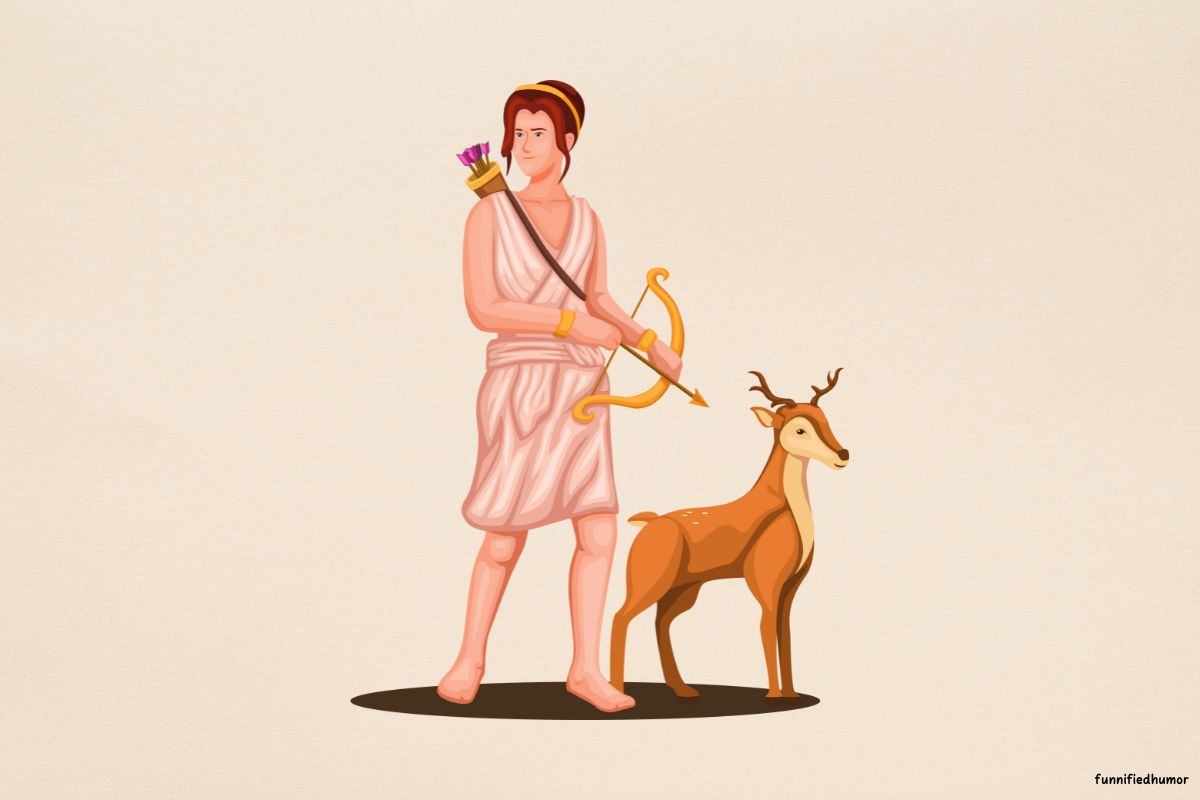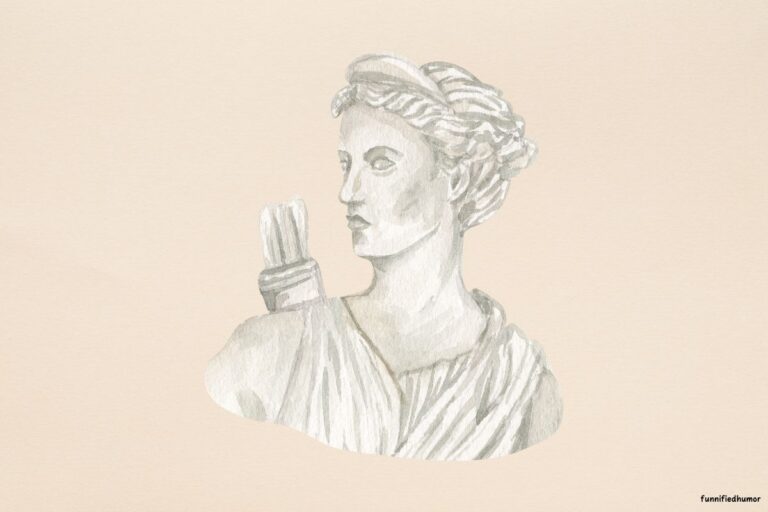3 Epic Stories about Artemis

In a world where the boundaries between the celestial and terrestrial blurred, where the winds carried tales of old and the oceans mirrored the vastness of the cosmos, there existed a deity, fierce and untamed.
Her name?
Artemis.
Goddess of the wild, the hunt, and the moon, she moved with a grace that belied her lethal precision, her arrows finding their mark every single time. Bathed in moonlight and flanked by her immortal hunting hounds, her story is one of power, passion, and paradox.
For Artemis, born of the ancient world, was more than just a legend; she was a force, a spirit of nature, an embodiment of the wild unknown. The stories on Artemis carry their own vital scent of perfection – lethal in approach and vast in valor.
Let’s check out some of them.
Stories about Artemis
1: Stag or Human: Artemis and Actaeon
In a verdant glade within the heart of a thick, ancient forest, a spring murmured softly, its clear waters sheltered by cypress trees and myrtles. It was in this secluded grove, away from prying eyes, that Artemis, the ever-virginal goddess of the hunt, would retreat with her retinue of nymphs to bathe and relax after a hard day’s hunt.
One fateful day, a young and skilled hunter named Actaeon was wandering the forest with his pack of hunting dogs. By a stroke of misfortune or perhaps just errant curiosity, he stumbled upon the hidden grove just as Artemis and her nymphs were bathing. Entranced by the beauty he beheld, Actaeon paused, inadvertently catching sight of the naked goddess.
Artemis, known for her fierce protection of her chastity and privacy, felt an immediate surge of indignation and anger. No mortal man was allowed to see her in such a vulnerable state and escape unscathed. As Actaeon stood there, still dazed by the unexpected sight, Artemis took swift action. Splashing some of the water from her bathing spring onto the young hunter, she uttered a curse.
No sooner had the droplets touched him than Actaeon began to transform. His limbs grew and reshaped, antlers sprouted from his head, and his once human form was replaced by that of a magnificent stag. Yet, his mind remained agonizingly aware, trapped within the beastly form.
Terrified and disoriented, Actaeon fled from the grove. But as he did, the barking of dogs reached his ears—his own hunting hounds. They had caught the scent of the stag he’d become and, not recognizing their former master, gave chase. Actaeon tried to flee, to shout, to communicate with them, but all that emerged from his mouth were the desperate sounds of an animal in distress.
Despite his best efforts to escape, the pack caught up with him. To his horror, his beloved dogs, with whom he’d shared so many hunting trips, attacked, tearing him apart in their fervor.
Actaeon’s tragic end served as a cautionary tale about the dangers of trespassing upon the domain of the gods and the dire consequences that could come from crossing paths with the unpredictable powers of the divine.
Note: Like many Greek myths, there are variations of the story, and it has been told in different ways by different ancient authors. Some say Actaeon boasted about being a better hunter than Artemis, others claim his punishment was an accident. Regardless of the variations, the central themes remain the same, illustrating the mortal peril of offending the gods and the fragile line between man and nature.

2. Moonlit Pursuit: The Tale of Artemis and Orion
In a world where gods walked among mortals, the forests of ancient Greece were a refuge for Artemis, the goddess of the hunt, wilderness, and the moon. Her silver arrows were as sharp as her focus, and her keen eyes missed nothing under her dominion.
One day, as Artemis roamed the forests with her band of nymphs, she encountered a stranger – a tall, imposing mortal named Orion. He was renowned as a skilled hunter, his feats known across the lands. Yet, it was not just his prowess with the bow that caught Artemis’s attention, but also his deep respect for nature.
Over time, Orion and Artemis found kinship in their shared passion for hunting. They would race against each other to catch the fastest deer or aim for the highest flying bird. The goddess, who had always been wary of mortal men, found herself looking forward to their meetings.
Orion, for his part, was captivated by the grace and prowess of the moonlit goddess. Every glance from her was like a shimmering arrow to his heart, and he cherished the moments when they would sit together, discussing their adventures and watching the moon rise.
But as with all tales that brush the heartstrings of deities, complications arose. Apollo, Artemis’s twin brother and the sun god, was protective of his sister. He had seen countless mortals falter and feared that Artemis would be hurt by her connection to Orion.
One fateful day, Apollo devised a plan. He pointed out a tiny speck far out at sea and challenged Artemis, boasting of her unparalleled archery skills, to hit it. Without realizing the speck was Orion’s head, she took aim and released her arrow. As the arrow found its mark, a terrible realization dawned upon Artemis. She had unwittingly taken the life of the one mortal she had grown fond of.
Grief-stricken, Artemis appealed to the gods to bring Orion back, but even their power had limits. Instead, she did the next best thing she could. She transformed Orion into a constellation, placing him amidst the stars where he would forever shine brightly, a testament to their brief yet unforgettable bond.
To this day, every time the constellation of Orion rises, it is a reminder of the love and camaraderie that blossomed between a goddess and a mortal, and the tragic cost of a split-second decision. Artemis, in her celestial form as the moon, often seems to linger close to Orion in the night sky, a silent apology and an eternal bond.
Note: The story I provided is a creative retelling and an amalgamation of various myths surrounding Artemis and Orion. In Greek mythology, Artemis and Orion do share a relationship, but the exact nature and details of their interactions vary depending on the source.

3. The Celestial Twins: Artemis and Apollo
Once, in the vast expanse of the cosmos, two brilliant stars were destined to shine – Artemis and Apollo. But their journey to the night sky was anything but smooth.
Leto, a radiant constellation, harbored a secret she had shared with Zeus, the supreme ruler of the universe. Their secret? The birth of twin stars. However, Hera, Zeus’s jealous partner, discovered this secret and, in her fury, decreed that Leto could not give birth anywhere in the universe where light touched.
Desperate and heavy with her unborn stars, Leto roamed the celestial realms, searching for a place untouched by light. At last, she stumbled upon the secluded Floating Isles of Delos, where darkness prevailed. Here, Artemis, the silvery star, was born first, illuminating the realm with her glow. Using her newfound light, she assisted in the birth of her brother, Apollo, a golden star shining just as brilliantly.
As time passed, the twins carved their own destinies:
Artemis, with her silvery glow, roamed the vast expanse, guarding young constellations and leading the nightly parade. But one evening, Actaeon, a wandering star, stumbled upon her radiant dance. Enraged by his intrusion, Artemis, in her fury, cast him into the abyss, where he was consumed by black holes.
Apollo, golden and dazzling, serenaded the universe with harmonies so profound that even the distant galaxies hummed along. Yet, love played a cruel game on him. Struck by Cupid’s cosmic arrow, he was pulled towards Daphne, a beautiful nebula. But she, struck by a different arrow, spiraled away, eventually transforming into the magnificent Laurel Galaxy. Apollo, heartbroken, circled her, creating an eternal dance of longing in the heavens.
But their strength was truly tested when they faced their greatest challenge. The shadows of their past, in the form of Python, a dark vortex, threatened the cosmic peace. Python, once Hera’s weapon to torment Leto, sought revenge against the twins. After a celestial battle that left stardust trails for millennia, the twins emerged victorious, forever sealing their legacy.
Their stories, their dances, and their battles are what we see today when we gaze at the night sky: a testament to resilience, love, and the enduring glow of family. So, the next time you look up, remember the tale of Artemis and Apollo – the celestial twins who continue to light up the cosmos with their legends.






